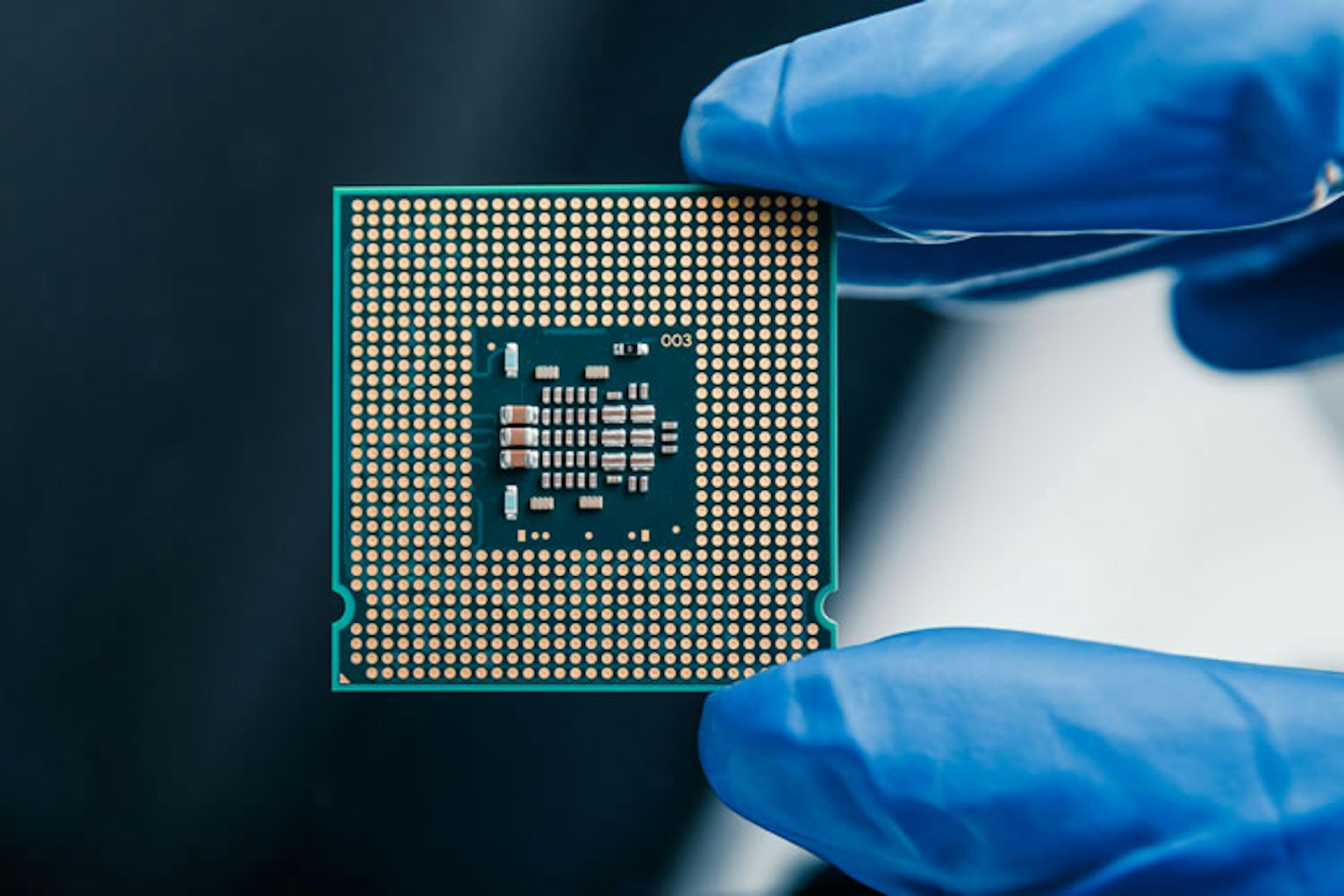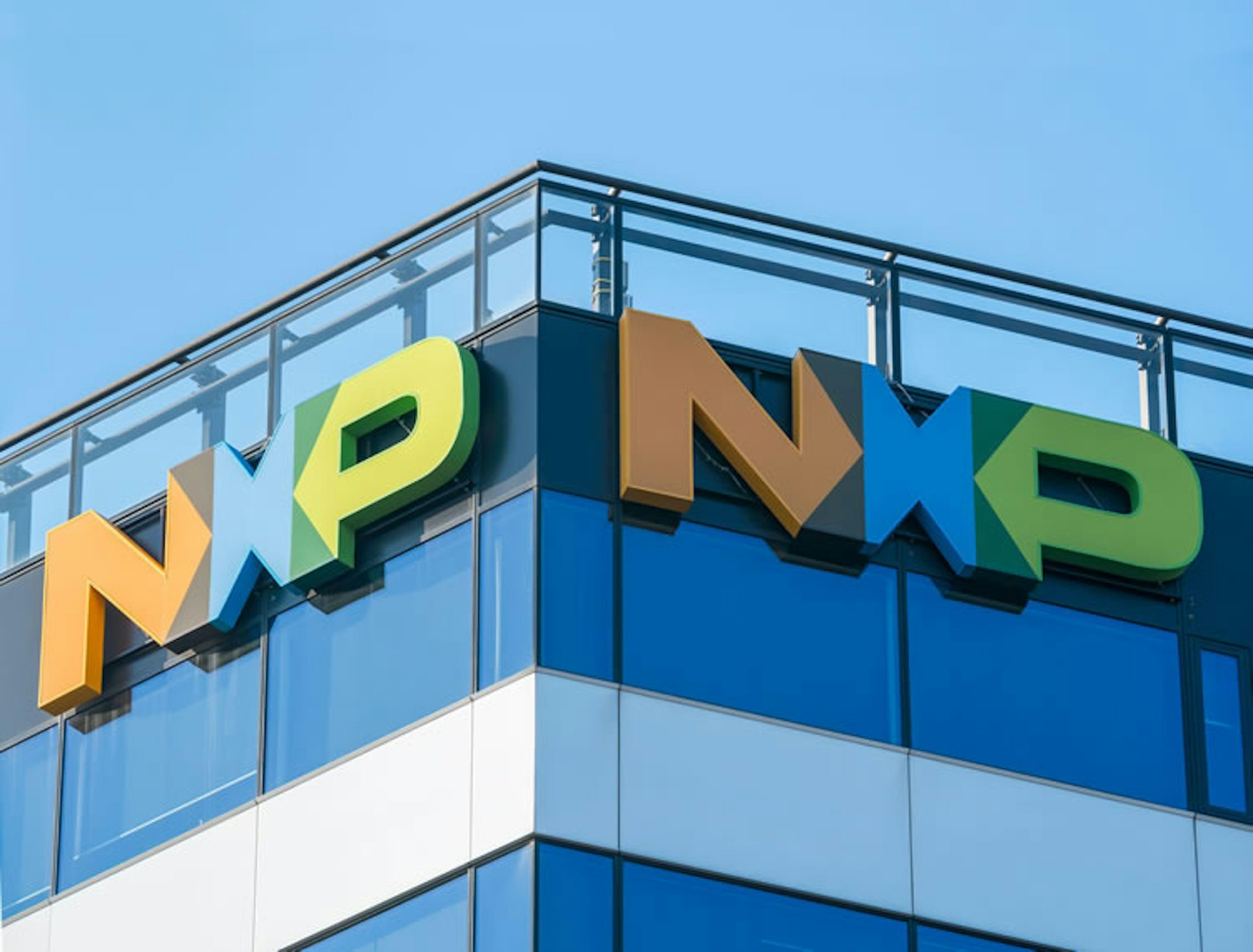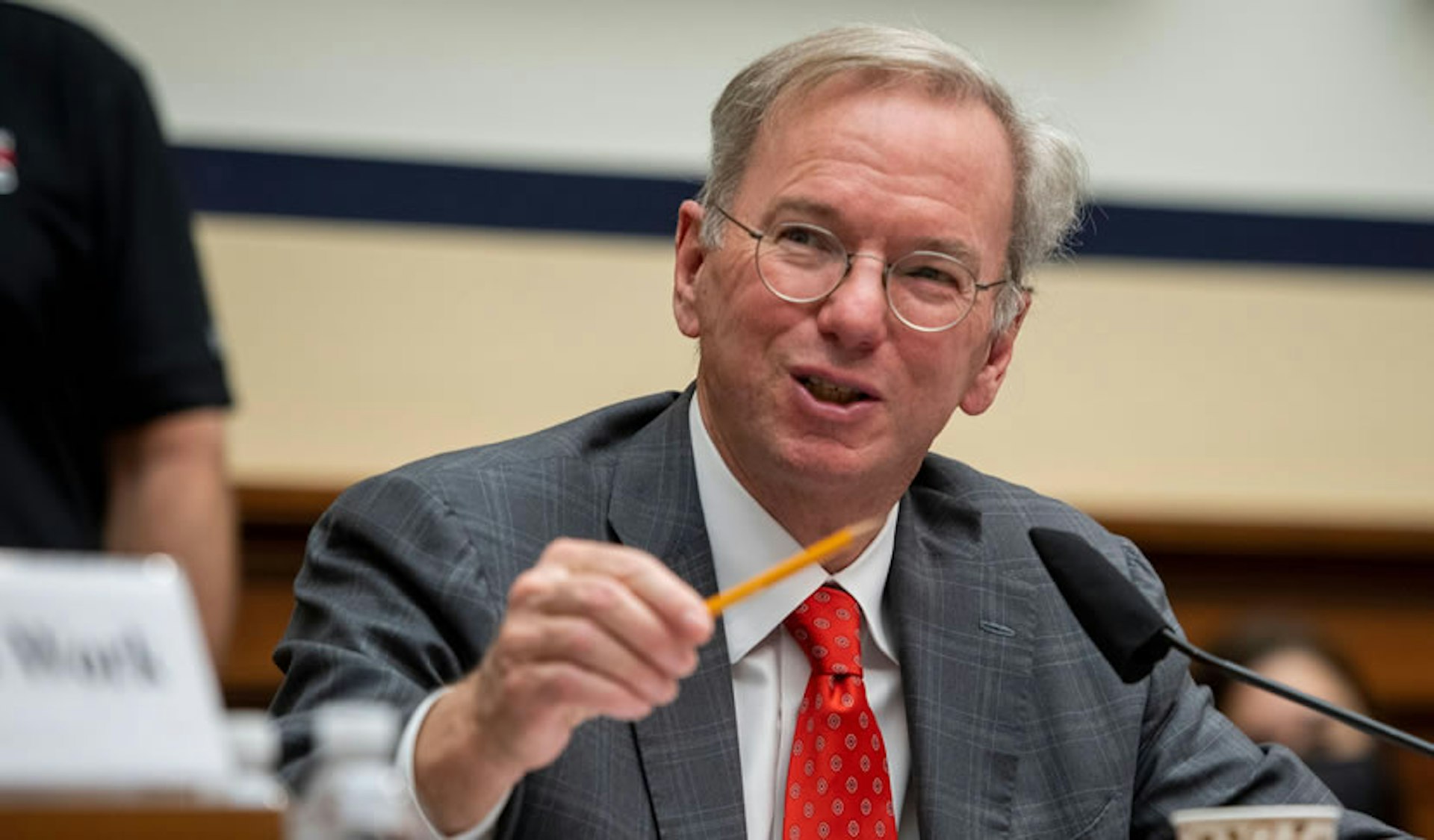Former Google CEO Eric Schmidt and his proxies played a major role in shaping legislation to boost the U.S. semiconductor industry—legislation that could directly benefit Schmidt’s network of investments, according to a Tech Transparency Project (TTP) investigation that sheds new light on the billionaire’s influence efforts in Washington.
A TTP review of White House meeting records, public comments, nonprofit documents, lobbying disclosures, campaign finance data, and other public records reveals that Schmidt’s involvement in the development and passage of the CHIPS and Science Act, which President Biden signed last year, goes far beyond what has previously been reported.
The records show that Schmidt personally consulted with lawmakers on the legislation that became the CHIPS Act and may have even inspired the original bill’s title. They also show how Schmidt and his allies mounted a campaign to push the measure through Congress and established close ties with the Department of Commerce, the agency now in charge of distributing billions of dollars in CHIPS Act funding. Meanwhile, elements of Schmidt’s portfolio appear to be positioning themselves to take advantage of the vast pool of government money.
Schmidt’s role with the CHIPS Act adds to growing questions about the billionaire’s efforts to influence U.S. defense and national security policy in ways that could advance his financial interests. TTP has previously documented Schmidt’s deep ties to America’s Frontier Fund, a nonprofit venture fund designed to direct U.S. defense investments, and his use of government staffing programs to place acolytes in key federal agencies.
Now Schmidt and his team are poised to benefit from the new CHIPS Act, which will pump more than $50 billion into the domestic U.S. semiconductor industry.
In a statement, a spokesperson for Schmidt said, "Eric has volunteered his time to serve on several US government committees over the years under several Administrations, both Democrat and Republican," adding, "He has fully complied with all necessary disclosure requirements and is one of many successful executives and entrepreneurs committed to addressing America’s shortcomings in technology, AI, and other related areas."
Schmidt shapes the original bill
Schmidt laid the groundwork for the policy proposal that would become the CHIPS and Science Act as the chair of the National Security Commission on Artificial Intelligence (NSCAI). As NSCAI chair, Schmidt frequently invoked China’s rapid technology advances as a reason that the U.S. should direct more government funding to tech research and development.
In 2019, Senate Democratic leader Chuck Schumer announced a draft proposal to provide $100 billion in government funding for cutting-edge technology aimed at helping the U.S. compete with its adversaries, particularly Russia and China. He said that he had “received input” from Schmidt on the plan, which would provide research funding to private companies as well as universities and governments.
In 2020, Schumer and California Rep. Ro Khanna (D) introduced the proposal as the Endless Frontier Act, named after a 1945 government report called “Science – The Endless Frontier.” The bill called for $100 billion in tech innovation funding to be administered by the White House Office of Science and Technology Policy (OSTP).
Schmidt is a longtime donor to Schumer and Khanna. The former Google CEO and his wife, Wendy, have made the maximum allowable contributions to both lawmakers in three of the past four election cycles. Additionally, Schmidt has given more than $3 million to the Schumer-affiliated Senate Majority PAC. Schmidt also appeared on a list of “technology leaders” who endorsed Khanna’s unsuccessful first congressional campaign, in 2014.
Schmidt may have actually provided the inspiration for the name of the Schumer-Khanna bill. In a 2017 op-ed calling for more government funding for science, Schmidt and Eric Lander, then president of the Broad Institute, cited the 1945 Endless Frontier report as a “blueprint” for bringing together the public and private sectors to “drive progress and innovation.” Lander, a Schmidt ally, went on to become Biden’s science adviser and director of the White House Office of Science and Technology Policy but later resigned amid reports of bullying. (After Lander resigned, Politico reported that Schmidt enjoyed unusual influence over OSTP’s personnel decisions during Lander’s tenure, raising ethical questions.)
The 2020 version of the Endless Frontier Act died in committee. But in April 2021, Schmidt and a group of former national security leaders sent a letter to Biden encouraging him to support the bill and provide funding to boost the domestic microchip sector. A week later, Khanna and Schumer introduced a new version of the Endless Frontier Act, this time calling for the fund to be administered by the Department of Commerce.

Schmidt pushed Congress and the White House to boost funding for the U.S. microchip industry.
Schmidt’s proxies quickly set to work advocating for the Endless Frontier Act. Two days after the bill’s reintroduction, The Day One Project, a Federation of American Scientists initiative funded by Schmidt, co-hosted a panel discussion to promote the bill. Schmidt Futures’ chief innovation officer, Tom Kalil, appeared on the panel. Meanwhile Schmidt’s fellow NSCAI commissioner Gilman Louie advocated for government investments in semiconductors and microelectronics at a May 2021 Brookings Institution event.
In mid-May 2021, the Senate rolled the Endless Frontier Act into the broader United States Innovation and Competition Act of 2021 (USICA). Amendments to the bill appeared to have Schmidt’s fingerprints on them. A press release from Colorado Sen. Michael Bennet (D) said his amendments “draw on recommendations from the National Security Commission on Artificial Intelligence, an expert group chaired by Eric Schmidt, co-founder of Schmidt Futures and former CEO of Google.”
Schmidt was vocal in claiming credit for the bill’s progress and urging Congress to finish the job. The day after the bill passed the Senate, Schmidt and his NSCAI co-chair, Robert Work, issued a statement urging Congress to pass the USICA. A month later, in July 2021, Schmidt told Nikkei Asia that NSCAI “played a big role” in pushing the legislation through the Senate, and he promised that “[w]e are clearly going to continue pushing” for the bill to become law. A version of the bill was introduced in the House shortly after Schmidt’s Nikkei interview.
Schmidt also appeared to make inroads with a high-profile supporter of the bill: Commerce Secretary Gina Raimondo, whose agency was poised to administer billions in research and development funding under the USICA. Raimondo delivered the keynote address at the NSCAI Global Emerging Technology Summit in July 2021. Schmidt also spoke at the summit.
America’s Frontier Fund primes the pump
The USICA languished in the House for the remainder of 2021, but Schmidt’s allies wasted no time in setting up structures that would allow them to cash in when the bill passed.
On Sept. 1, 2021, Schmidt Futures’ Jordan Blashek incorporated an investment vehicle called America’s Frontier Fund (AFF) in homage to the same 1945 Endless Frontier report referenced in Schmidt’s calls for science funding. AFF appears to be modeled after In-Q-Tel, the CIA-backed investment fund that faced allegations of conflicts of interest stemming from its trustees’ investments in funded companies. In-Q-Tel’s former chief executive, Gilman Louie, signed on as AFF’s president.
As TTP previously reported, America’s Frontier Fund has the potential to steer federal dollars to Schmidt’s own investments. The former Google CEO is reported to have invested millions of dollars in defense startups, which could receive R&D funding that flows through AFF. A since-removed press release on the AFF website included Schmidt in a list of “AFF’s Board of Directors and anchor funders,” and he is closely tied to many of the group’s leaders.
Schmidt reportedly wanted the government to put up $1 billion of funding for AFF. A job posting that was later deleted shows that the nonprofit venture fund planned to have a “Government Fund," with the departments of Commerce, Defense, and Energy as the “primary government clients.” Nonprofit registration documents show that AFF expected to receive $100 million in contracts from U.S. government agencies by the end of 2023.

Emails obtained via public records request show how AFF staff worked to get buy-in from the White House even before the group was formally incorporated.
According to the emails, Schmidt Futures invited Eric Lander, then the head of the White House Office of Science and Technology Policy (OSTP), to his exclusive annual retreat at the Yellowstone Club, a private resort in Big Sky, Montana, in July 2021. As TTP has previously reported, Schmidt uses the secretive retreat, frequented by politicians, executives, and celebrities, as a form of “soft power” to push his business agenda with influential players in a swanky private resort.
The invitation promised unusual perks. The documents reveal that Lander, along with his wife and daughter, were scheduled to fly to and from Montana on a private jet chartered by Schmidt Futures. The Landers were told they would share lodging with other high-powered guests, including former Italian Prime Minister Matteo Renzi and Mathias Cormann, the general-secretary of the Organization for Economic Co-operation and Development (OECD). Guests at the retreat were invited to attend a “Night Under the Stars” welcome reception, a “Family Rodeo Evening,” and “After Hours” parties. The lodging was described as “luxurious, mountain-style homes often with dramatic views,” and activities included archery, fly fishing, horseback riding, wine tasting, and a spa.
The emails indicate that Lander, who’s had close ties with Schmidt for years, had attended the Yellowstone Club retreat with his family at least once before. But his apparent attendance in 2021 came at a time when he served as Biden’s top science adviser—and head of the White House charged with implementing some aspects of the semiconductor bill.
A Lander spokesperson told Fox News, which earlier reported on the Yellowstone emails, that Lander had "reimbursed all applicable expenses" for the trip and that the White House counsel's office had approved the travel. A White House OSTP spokesperson told Fox that Lander attended the event in a personal capacity.
Additional emails released by the White House indicate that Schmidt associates discussed AFF with OSTP staff around the time of the 2021 Yellowstone Club retreat. On the Tuesday after the retreat, Chris McGuire, OSTP's senior advisor for international security, emailed Gilman Louie, referring to "the initiative that we discussed on Friday.” The previous Friday, July 16, was the first full day of the Yellowstone Club event, per a schedule sent to Lander. The emails make clear the "initiative" in question was AFF: Schmidt Futures’ Jordan Blashek responded to McGuire and Louie with a brief about America’s Future Fund (as AFF was then known).
The emails and White House meeting records indicate that Louie met with McGuire on Aug. 4, 2021, and Blashek had a follow-up conversation with McGuire by phone. (McGuire previously served under Schmidt at the NSCAI.)
An AFF spokesperson, responding to questions sent to Louie and Blashek about the OSTP meetings, wrote, "Prior to founding AFF, we spoke to a number of relevant thought leaders and experts." The spokesperson said that no AFF employees, including Louie and Blashek, attended the Yellowstone retreat.
The White House appeared supportive of the initiative, but Congress still had to approve the legislation—and by early 2022, AFF's leaders were busy pushing for USICA’s passage. In Feb. 2022, Schmidt and AFF board member Michèle Flournoy signed on to a letter to congressional leaders reiterating his priorities within the legislation, namely the Endless Frontier Act, appropriations to support semiconductor manufacturing, and funding for rollout of 5G and other advanced telecommunications technology.
On Feb. 4, 2022, the House passed its own version of the USICA. The White House rechristened the bill the Bipartisan Innovation Act and urged the House and Senate to forge a compromise and finish the job. Six weeks later, AFF retained the white shoe law firm Arnold & Porter, according to lobbying records.
AFF and Schmidt also sought to strengthen their relationship with the Commerce Department. In late March 2022, Commerce Secretary Raimondo tapped Schmidt and H.R. McMaster, who served as President Trump’s national security adviser and sits on the board of AFF, to join a panel of national security experts pushing for the legislation. Another participant, former Trump State Department official Keith Kratch, cited the panel as evidence that Raimondo “works well with the private sector.” In April, the Commerce Department appointed AFF to a consortium led by the Semiconductor Research Corporation tasked with helping “industry, academia, and government to make critical strategic decisions regarding technology, manufacturing and workforce development.”
AFF also provided guidance to the Commerce Department as it prepared for the anticipated passage of the tech funding bill, urging the department to work closely with private investors. In a March 25 response to a request for information, AFF Chief Science Officer Edlyn Levine wrote, “The [Commerce] Department should consider ways to partner directly with trusted sources of private capital to raise at least a 10x leverage for all of its strategic decisions.”
In late May, Gilman Louie submitted testimony to the Senate Finance Committee’s trade subcommittee, laying out AFF’s proposed priorities for government science funding. Louie’s testimony closely resembled parts of Levine’s March 25 comments to the Department of Commerce; both documents bemoaned the lack of tech investment outside of five “coastal cities” and urged the federal government to foster tech hubs elsewhere in the country.

Schmidt allies like Gilman Louie helped make the case to Congress.
Schmidt’s allies also continued to stoke fears of America’s foreign adversaries. “We must do whatever it takes to avoid a future scenario in which the United States can be cut off from key technologies by an authoritarian regime such as Russia or China,” Louie told the Senate subcommittee. Six days later, Levine appeared on a panel entitled, “Why the Bipartisan Innovation Act is Crucial for National Security.” Jack Shanahan, an adviser to the Special Competitive Studies Project, a group that functions as Schmidt’s private version of NSCAI, also joined the panel.
Shortly after its public launch in June 2022, AFF began publishing social media posts imploring readers to “act now” to prevent the U.S. from falling behind in microelectronics, AI, and other technologies. The posts echoed Louie’s Senate testimony, in which he told the committee that “[t]he time to act is now.”
Around this time, AFF moved to hire a legislative affairs director who would be “initially heavily focused on work in microelectronics technology competitiveness, and national security legislation.” As a nonprofit, AFF is legally prohibited from making lobbying “a substantial part of its activities.” But the Schmidt-backed group spent at least $140,000 in lobbying fees paid to Arnold and Porter in 2022, according to disclosures. AFF also retained the PR firm Bully Pulpit Interactive in 2022. While Bully Pulpit’s exact scope of work for AFF is unclear, the company appeared to claim some credit for pushing the semiconductor legislation over the finish line, calling it “the battle we just won.” An AFF spokesperson said the fund “applauded” the CHIPS Act but “did not lobby for its passage.”
Schmidt himself publicly reentered the fray in late June with an op-ed in the Wall Street Journal, co-authored by Harvard Professor Graham Allison, calling for the passage of the USICA as a “first step in preventing Chinese dominance.” He appeared in the paper again in July, after the Journal published an editorial calling the USICA a “corporate welfare vehicle.” In a letter to the editor, the former Google CEO again raised the specter of an ascendant China and called the legislation “vital,” without mentioning his personal financial interest in seeing the bill pass. “Without the USICA’s federal support, we’re simply not playing to win,” Schmidt wrote.
Finally, in late July 2022, Congress gave final approval to the bill, now called the CHIPS and Science Act. The bill passed with the core provisions of the Endless Frontier Act, including $52 billion for domestic semiconductor manufacturing incentives, research and development, and supply chain innovation on top of a 25% tax credit for capital investments by semiconductor manufacturers. The bill also authorized $10 billion in spending for regional technology hubs across the country, echoing AFF’s calls to create “regional centers of excellence” outside of coastal cities. And the bill set aside $1.5 billion for wireless technologies, another policy priority of Schmidt’s.
AFF’s leaders made clear that they expected to part of the action. A statement attributed to Louie, issued a day after Congress approved the bill, said AFF “stands ready to help turn the vision of the CHIPS Act into reality.” Just before the legislation’s final passage, Blashek said AFF wanted to “give granular insight into where we think the biggest opportunities are for disruptive US semiconductor leadership,” while Levine called the CHIPS Act a “once-in-a-generation opportunity.”
Schmidt and AFF get ready to cash in
Even as Schmidt and his allies were working to pass the legislation, they were positioning themselves to take full advantage of the government funds. It was a familiar playbook for Schmidt, who has previously faced questions about his personal investments in companies that stand to benefit from the policies that he promotes.
For example, Steel Perlot, a company focused on “multi-generation platforms” where Schmidt serves as chairman and his reported girlfriend, 29-year-old Michelle Ritter, serves as CEO, made moves to expand its semiconductor portfolio. (Former White House Office of Science and Technology Policy Director Eric Lander is also on the executive board of Steel Perlot.)
In April 2022, as the USICA neared passage, the company hired a semiconductor and nanotechnology manager and posted a job ad for a scientific consultant tasked with vetting candidates for a “Semiconductor Advisory Board.” Less than three weeks after Biden signed the CHIPS and Science Act in early August, Steel Perlot took part in a $4 million seed funding for Ingonyama, a semiconductor company that has staff in Israel and is registered to do business in the United States. In late 2022 or early 2023, Steel Perlot joined the American Semiconductor Innovation Coalition, a group that appears primarily focused on influencing two key Commerce Department semiconductor development programs.
These investments add to Schmidt’s existing portfolio of semiconductor investments. The Schmidt Family Foundation holds shares in NXP Semiconductor and a number of other semiconductor companies, including Taiwan Semiconductor Manufacturing Company, On Semiconductor Corp, NVIDIA, and Micron Technology. Tomorrow Ventures, another Schmidt-founded investment firm, holds nearly a million shares in Navitas Semiconductor, a circuit and electronics manufacturer.

The Schmidt Family Foundation holds shares in NXP Semiconductor and other chip-making companies.
AFF, meanwhile, appears to be positioning itself to profit from the government funding earmarked for regional technology hubs. In February 2023, AFF gave the Securities and Exchange Commission notice that it had launched Frontier Fund I with an initial raise of $500 million.
In Nov. 2022, AFF’s Gilman Louie and Lilian Wan pitched the New Mexico State Investment Council on a for-profit “venture studio” focused on creating “frontier technology” startups in Albuquerque. At the November meeting, the council unanimously approved a $100 million investment in the AFF-managed fund, Frontier Fund I LP, to support the effort.
The AFF-backed “venture studio,” which is headed by a Schmidt Futures veteran, appears tailored to fit within a Department of Commerce program funded by the CHIPS Act. According to the investment council’s annual report to the state legislature, “The features AFF cited for choosing New Mexico to launch its investment effort include NM’s federal labs, universities, entrepreneurial network and skilled workforce.” That largely corresponds with the requirements for applicants seeking federal tech hub funding. In a FAQ, the U.S. Economic Development Administration said it would only award such funding to “consortia” that include some combination of universities, government agencies, economic development organizations, labor organizations, and private technology companies.
In a keynote address to the Innovate New Mexico conference on March 7, 2023, AFF General Partner Norman Winarsky indicated that his fund was working to win government investments. Winarsky told attendees that AFF differs from other funds in that “some of the investors, we hope—and we’re in the midst of raising these investments now—will be the governments … but limited partners, the people who invest in this fund, will be rewarded just as if they participated in any fund.”
The AFF spokesperson said the fund "aims to inform and educate industry and government through its research and thought leadership," adding, "We have not applied for nor have we received any CHIPS Act funding." The statement did not address whether AFF-backed entities may seek CHIPS funding.
The federal government has yet to award grants for tech hub funding. But the Department of Commerce recently said more than 200 entities submitted statements of interest for the first tranche of CHIPS Act manufacturing incentives. The agency did not name the interested parties.
Even with government funding for his pet projects on the near horizon, Eric Schmidt has indicated that he will push for even more subsidies in the years to come.
In October, Ro Khanna, the Endless Frontier Act’s original House sponsor, indicated that Schmidt was already turning up the heat on lawmakers. “Now, the problem is that, you know, China, as Eric Schmidt says, does one of these CHIPS Acts every year,” Khanna said. Around the same time, on a call to promote a new report by the Special Competitive Studies Project, Schmidt suggested that his quest to secure more government funding for tech companies was far from over.
“Everyone assumes we passed the USICA CHIPS Act and we’re done,” Schmidt said. “In practice, of course, it’s just the beginning.”




